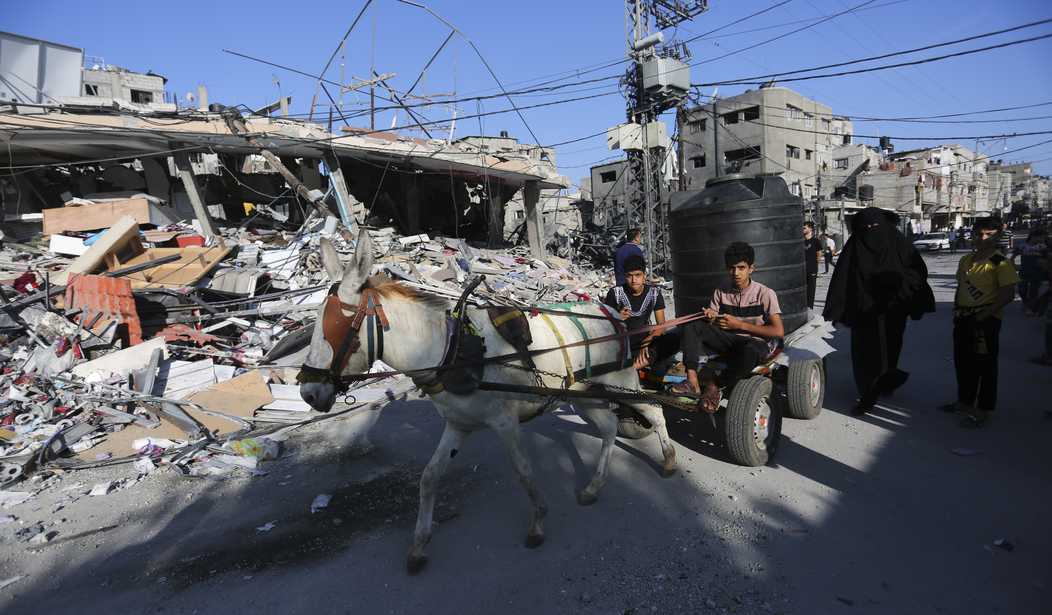In advance of an attack on Rafah, the last stronghold of Hamas in Gaza, Israel is ordering all civilians to leave the city. Rafah's pre-war population of about 300,000 has swollen to 1.4 million after Israel's attacks elsewhere on the Gaza Strip. The Israeli army didn't say to where the 1.4 million civilians should evacuate.
Rafah sits on the border with Egypt and Cairo has already warned Israel that an exodus of civilians from Rafah into Egypt would threaten the 40-year-old peace treaty with Israel. This has always been Egypt's primary concern; the Palestinian refugee problem that bedeviled Jordan, Lebanon, and Israel would now become Egypt's problem.
The Biden administration told Israel that it could not support a Rafah operation without sufficient planning for the care of civilians. That's not going to happen. Israel's Prime Minister Benjamin Netanyahu has an opportunity to end the war by clearing out Rafah even though there would be plenty of Hamas terrorists left. The Israeli prime minister could declare "victory" and essentially dictate terms to Hamas.
But the civilians in Rafah literally have no place else to go. Where will 1.4 million people hide in a city that had one-quarter of that number of residents pre-war?
“It is clear that a massive operation in Rafah requires the evacuation of the civilian population from the combat zones,” Netanyahu said in a statement. He told the IDF to come up with a plan but there's no place else in Gaza where that number of people can take refuge.
This is not going to stop Netanyahu. The prime minister rightly sees the cleansing of Gaza to be the war's last great act.
“The last stop was supposed to be Rafah,” Isra Shehada, 33, told an NBC News crew. “After Rafah, we only have God. Where can we go next ?”
“It is impossible to achieve the war goal of eliminating Hamas and leaving four Hamas battalions in Rafah,” Netanyahu's office said Friday. The statement referred to “a dual plan for both the evacuation of the population and the dismantling of the battalions," but it's hard to see how the IDF is going to "dismantle" Hamas battalions, much less evacuate the civilians. Israel will try to destroy the Hamas fighters and hope the civilian death toll isn't excessive.
Aid agency officials have also sounded warnings over the prospect of a Rafah offensive. “We need Gaza’s last remaining hospitals, shelters, markets and water systems to stay functional,” said Catherine Russell, head of the U.N. children’s agency UNICEF. “Without them, hunger and disease will skyrocket, taking more child lives.”
With the war now in its fifth month, Israeli ground forces are still focusing on the city of Khan Younis, just north of Rafah, but Netanyahu has repeatedly said Rafah will be next, creating panic among hundreds of thousands of displaced people.
On the diplomatic front, U.S. Secretary of State Antony Blinken left the region empty-handed, although there's still hope that some kind of a cease-fire deal can be struck. Hamas's ludicrous "offer" to stop fighting for six months and exchange hardened terrorists for civilians wasn't even considered by the Israelis.
Hamas is playing the (very) long game. Every dead Palestinian, every bombed-out house and building, every "martyr" to the Hamas cause, is a recruiting poster for the terrorists. There will be no peace in Gaza and Hamas is going to make sure of that.
Netanyahu has rejected Hamas’ demands for a hostage deal, which includes an end to the war and the release of hundreds of veteran Palestinian prisoners serving long sentences in Israel for deadly attacks carried out as part of the long-running conflict. Netanyahu dismissed Hamas’ demands as delusional, even as Blinken said he believes continued negotiations, through mediators Egypt and Qatar, are possible.
Israel’s war goals appear increasingly elusive, as Hamas reemerges in parts of northern Gaza, which was the first target of the offensive and has seen widespread destruction. Israel has only rescued one hostage, while Hamas says several have been killed in airstrikes or failed rescue missions.
Joe Biden is discovering what American presidents from Eisenhower to Trump have discovered. "Peace" is a relative term in the region when two implacable enemies are looking to annihilate one another. Thus has it always been. Thus it will always be.










